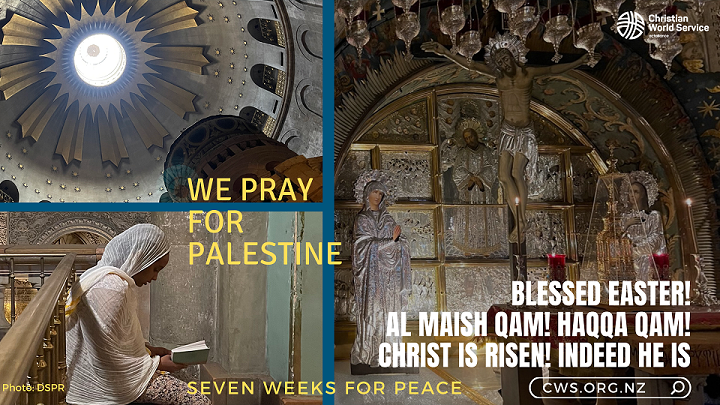CWS invites you to pray for peace with us through the seven weeks of Lent, an initiative of the Lutheran World Federation. The campaign was launched on Ash Wednesday with a focus on Ukraine. In the second week we prayed for Afghanistan. In week 3 we prayed for Ethiopia and South Sudan. In week 4 we prayed for West Papua. In week 5 we prayed for Haiti. In week 6 week we prayed for Pakistan. In week 7, we pray for Palestine.
Loving God
We pray for peace in Palestine
For an end to the violence of Occupation
That tightens the borders and keeps people captive,
Unable to go to work or get medical treatment
Knowing that at any time someone they know and love might be maimed or killed.
Loving God
We pray for peace in Palestine
For people who have fled their homes because of war or been forced out by the military,
Living with a deep sense of loss and injustice,
Crowded into small spaces with not enough food or water
Who long to walk freely on the streets and live without fear.
Loving God
We pray for peace in Palestine
For the land that bears witness to the ancient stories
of people who have wandered and found home;
for the safety and well-being of the women, men and children
of all faiths and traditions who belong to this land.
Loving God
We pray for peace in the Holy Land.
We pray in the name of the One who is the source of life and peace
Amen
#7weeksforpeace
Download Slide for Sunday.
The Church of the Holy Sepulchre (pictured) in east Jerusalem is known as the place where Jesus was crucified. It is a holy place maintained by Palestinian Christians. They give witness to the life, death and resurrection of Jesus, living alongside their neighbours who follow the Jewish and Muslim faiths.
An Easter message from our partner the Department of Service to Palestinian Refugees (DSPR):
John 19:26-27 exemplifies the love of the crucified to his disciple:
“When Jesus therefore saw His mother, and the disciple whom He loved standing by, He said to His mother: ‘Woman, behold your son!’ Then He said to the disciple, ‘Behold your mother!’ And from that hour that disciple took her to his own home.”
Love and kinship [between] significant and different others are hallmarks of the message impressed on us by the earthly life of Jesus. At times of transition when we are most pressed with the eventuality of separation, we tend to think of the people we love and we do ask ourselves whether we have done enough to care for them. In the crucifixion scene, extending a kinship link between His mother, Mary and John, His beloved disciple, becomes a reflection of the deep caring that Jesus felt for His mother. It is a strong message for all times and generations.
Love and caring imbue ecumenical work at times of personal, communal and global separations and tribulations. Our mothers are those who suffer displacements, lose children and stand helpless by the scenes of devastation visited on their families and communities by nature or by man. Our beloved others are all those who experience the anguish of separation and who seek recovery to lead a semblance of normal lives.
At times of natural disasters, like the earthquake that hit Turkey and Syria, or man-made, like the devastating war in the Ukraine and the ongoing harsh occupation of Palestinian land, love and caring for the victims of these disasters become synonymous with the human bonds that cross borders and ethnicities. Our love is unconditional as is the love of Jesus who suffered death on the cross and rose again. The ideal for love and caring is to enable the restoration of life to what it used to be before disaster and separation happened. The physical and psychological wounds felt after disasters are most difficult to heal but extending the human bond of love and caring is an essential act of reaching out and affirming our common humanity.
As we celebrate Easter which is the feast of Resurrection, we are reminded of the loving and caring scene of Jesus introducing His disciple to His mother and asking him to take care of her. Overcoming death, destruction and devastation, with all the difficult separation scenarios, is in the heart of the Easter message of taking care of the afflicted others. None of us is immune to affliction but all of us are called to love and care for each other.
Blessed Easter! Al Masih Qam! Haqqan Qam! Christ is Arisen! Indeed He is!
Dr. Bernard Sabella
Executive Secretary
Department of Service to Palestinian Refugees/Middle East Council of Churches Central Office
Jerusalem
DSPR works with Palestinian, Syrian and other refugees in Gaza, Jerusalem, Jordan, Lebanon and Nazareth to improve incomes and opportunities, especially for children and young people. It operates primary health clinics, schools, after school programmes and vocational training. Staff provide emergency assistance and as refugees themselves always provide a warm welcome. The 2022 Christmas Appeal featured some of the work they do to improve access to clean safe water.
April 6, 2023


